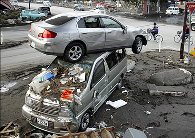 Market research firm JD Power on Tuesday said it has cancelled its annual awards function for the automobile industry, scheduled to be held this evening, on account of the devastating earthquake and tsunami in Japan.
Market research firm JD Power on Tuesday said it has cancelled its annual awards function for the automobile industry, scheduled to be held this evening, on account of the devastating earthquake and tsunami in Japan. "The event has been postponed due to the disaster, which has been of a very big proportion. The aftershocks are still continuing and in such cases we cannot have an award ceremony here," JD Power Asia Pacific Executive Director Mohit Arora told PTI. The dominant auto players in India such as Maruti Suzuki, Honda Siel Cars and Toyota Kirloskar are all Japan-based companies, he added.
"I believe that some relatives of some automakers or suppliers may also be affected in this tragedy," Arora said. He said the annual event -- JD Power Asia Pacific Awards Ceremony -- is likely to be organised in the next two months although it has not been finalised.
Indian car market leader Maruti Suzuki has cancelled the celebrations for rolling out its 1,00,00,000th car today in view of the devastating earthquake and tsunami last week. Likewise, Japanese auto major Honda said on Monday it postponed the preview of its small car Brio in India scheduled for March 17 due to the natural disaster.
Last week, compatriot Toyota had said it postponed the official inauguration of its second Indian manufacturing facility at Bangalore in view of the 8.9-magnitude quake, the most powerful since the 1923
All auto majors, which are controlled by managements from the island nation, are currently assessing any possible impact on sourcing parts from the supplier base of their parents. These auto majors, alongwith their other compatriots, source a large chunk of critical components from Japan.
Although, there has been no clear picture so far about the affect on import, but it seems companies will face tough time to continue production once the current buffer stocks end.
On March 11, an earthquake measuring 8.9 on Richter's scale hit Japan that was followed by a devastating tsunami that swept away houses, overturned ships, vehicles and set ablaze several buildings, including a petrochemical plant. It has left thousands of people dead or unaccounted for.
The country is now facing radiation scare with number of explosions occurring at the quake-hit Fukushima nuclear plant's troubled reactors.
All the four plants at Fukushima are reported to be in critical stage as the core of the No 1, 2 and 3 are believed to have partially melted following last Friday's earthquake.
All the four reactors have been shut down after the quake. Kyodo quoting nuclear experts said radiation equivalent to 400 times the level to which people can be exposed to in a year was detected near the Fukushima No 3 reactor.










 © 2025
© 2025